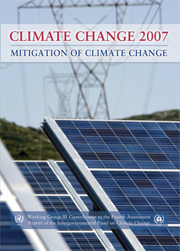 Climate Change 2007 - Mitigation of Climate Change
Climate Change 2007 - Mitigation of Climate Change Book contents
- Frontmatter
- Contents
- Foreword
- Preface
- Summary for Policymakers
- Technical Summary
- 1 Introduction
- 2 Framing issues
- 3 Issues related to mitigation in the long term context
- 4 Energy supply
- 5 Transport and its infrastructure
- 6 Residential and commercial buildings
- 7 Industry
- 8 Agriculture
- 9 Forestry
- 10 Waste management
- 11 Mitigation from a cross sectoral perspective
- 12 Sustainable Development and mitigation
- 13 Policies, instruments and co-operative agreements
- Annex I Glossary
- Annex II Acronyms, abbreviations and chemical compounds
- Annex III List of contributors
- Annex IV List of reviewers
- Index
12 - Sustainable Development and mitigation
- Frontmatter
- Contents
- Foreword
- Preface
- Summary for Policymakers
- Technical Summary
- 1 Introduction
- 2 Framing issues
- 3 Issues related to mitigation in the long term context
- 4 Energy supply
- 5 Transport and its infrastructure
- 6 Residential and commercial buildings
- 7 Industry
- 8 Agriculture
- 9 Forestry
- 10 Waste management
- 11 Mitigation from a cross sectoral perspective
- 12 Sustainable Development and mitigation
- 13 Policies, instruments and co-operative agreements
- Annex I Glossary
- Annex II Acronyms, abbreviations and chemical compounds
- Annex III List of contributors
- Annex IV List of reviewers
- Index
Summary
EXECUTIVE SUMMARY
The concept of sustainable development was adopted by the World Commission on Environment and Development, and there is agreement that sustainable development involves a comprehensive and integrated approach to economic, social, and environmental processes. Discourses on sustainable development, however, have focused primarily on the environmental and economic dimensions. The importance of social, political, and cultural factors is only now getting more recognition. Integration is essential in order to articulate development trajectories that are sustainable, including addressing the climate change problem.
There is growing emphasis in the literature on the twoway relationship between climate change mitigation and sustainable development. The relationship may not always be mutually beneficial. In most instances, mitigation can have ancillary benefits or co-benefits that contribute to other sustainable development goals (climate first). Development that is sustainable in many other respects can create conditions in which mitigation can be effectively pursued (development first) (high agreement, much evidence).
Although still in early stages, there is growing use of indicators to manage and measure the sustainability of development at the macro and sectoral levels. This is driven in part by the increasing emphasis on accountability in the context of governance and strategy initiatives. At the sectoral level, progress towards sustainable development is beginning to be measured and reported by industry and governments using, for instance, green certification, monitoring tools, and emissions registries. Review of the indicators illustrates, however, that few macro-indicators include measures of progress with respect to climate change (high agreement, much evidence).
- Type
- Chapter
- Information
- Climate Change 2007 - Mitigation of Climate ChangeWorking Group III contribution to the Fourth Assessment Report of the IPCC, pp. 691 - 744Publisher: Cambridge University PressPrint publication year: 2007


